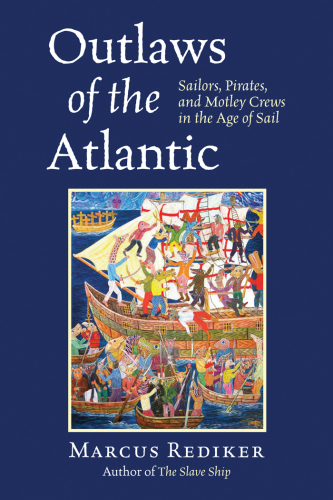
Outlaws of the Atlantic
Sailors, Pirates, and Motley Crews in the Age of Sail
- اطلاعات
- نقد و بررسی
- دیدگاه کاربران
نقد و بررسی

May 5, 2014
With a keen eye for interesting characters, historian Rediker (The Amistad Rebellion) delivers a brisk narrative about the “ordinary” men who traversed the Atlantic interlocking networks of empire and early capitalism. Edward Barlow, who went to sea in the mid-1600s at age 13, represents the Englishmen who chose to earn a living aboard ship. Henry Pitman, on the other hand, was forced into his seafaring adventures, having been sentenced to servitude in Barbados in 1685 as punishment for a political crime. He escaped by boat, encountering pirates and indigenous Americans on his journey home. But pirates, disruptive sailors, and unwilling passengers are the real stars. During the early 1700s, pirates threatened the stability of Britain’s empire, seizing property and damaging international trade. In the late 18th-century, sailors played a major role in the American Revolution, particularly in raising awareness of the horrors of Royal Navy press gangs. Meanwhile, African slaves regarded ships as locations of resistance, fomenting uprisings as they tried to destroy the lucrative slave trade (the dramatic 1839 Amistad case actually hinged less on slavery than on legal definitions of piracy). As Rediker’s nifty book demonstrates, on the high seas there was a fine line between hero and criminal. Illus.

June 15, 2014
Rediker (Atlantic History/Univ. of Pittsburgh; The Amistad Rebellion: An Atlantic Odyssey of Slavery and Freedom, 2012, etc.) explores maritime history from the bottom up, telling the stories of the "sailors, slaves, pirates and motley crews [who] shaped a history we have long regarded as white, elite, national, and landed."The author provides a top-notch examination of how indentured servants, privateers, pirates and slaves affected and even directed human history in the age of sail. He doesn't dwell on famous naval and exploratory voyages; he avoids the usual terracentrism and relies on the sea's unreal space and the sailors' yarns that spread news and views. The voyage narrative was a popular genre of 18th-century literature, and it was those tales that influenced writers like Daniel Defoe and Jonathan Swift. The most interesting thread that weaves through this book and creates the basis for Atlantic history is the effect of the "motley crews." These multiethnic groups, who patrolled the Atlantic as former slaves, privateers and pirates, had their own self-organization, standards of conduct and even pirate retirement communities. They were what Rediker calls social bandits, men who embodied an enduring phenomenon: peasants' protests against oppression, poverty and, most importantly, a cry for vengeance. These men fed the seaport crowds with the notion that moral conscience stood above state laws and legitimized their resistance. These crews also helped in the run-up to the American Revolution, including the Boston Massacre. The sailors spread the stories of revolt aboard merchant and slave ships through the Atlantic basin, from Boston to Africa to Saint Domingue to France, fomenting unrest and uprisings.An outstanding view of the "seaman" as a "preeminent worker of the world, a cosmopolitan in the truest sense, who shaped the history of our planet in profound and lasting ways."
COPYRIGHT(2014) Kirkus Reviews, ALL RIGHTS RESERVED.




دیدگاه کاربران